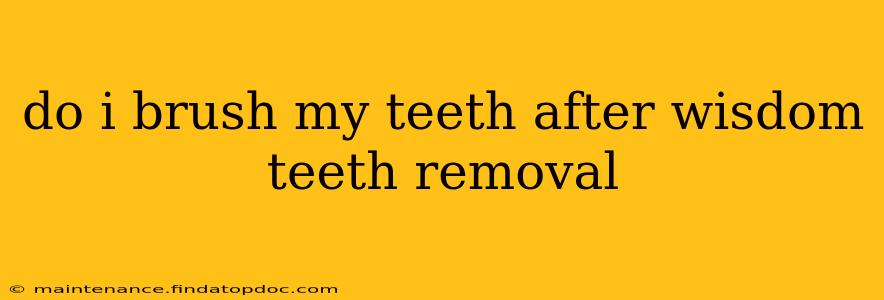Do I Brush My Teeth After Wisdom Teeth Removal? A Comprehensive Guide
Wisdom teeth removal is a common procedure, and proper post-operative care is crucial for a smooth recovery. Many patients wonder about oral hygiene, specifically: Do I brush my teeth after wisdom teeth removal? The answer is a qualified yes, but with important caveats. Brushing is essential for maintaining oral health, but the technique and timing need careful consideration.
When Can I Start Brushing After Wisdom Teeth Extraction?
This is a frequently asked question, and the answer depends on the specifics of your surgery. Generally, you should wait 24 hours after your wisdom teeth removal before resuming brushing. Your dentist or oral surgeon will provide specific instructions, but this 24-hour waiting period allows the initial blood clot to form, which is essential for healing and preventing dry socket.
How Should I Brush My Teeth After Wisdom Teeth Removal?
Gentle brushing is key. Avoid aggressive scrubbing, especially near the extraction sites. Focus on the areas away from the extraction sites first. Use a soft-bristled toothbrush and gently brush in a circular motion. Be extremely careful around the surgical areas to avoid disturbing the blood clot.
What if I Have Stitches?
If you have stitches, be extra gentle. Avoid brushing directly over the stitches; rinse gently instead. Your dentist or oral surgeon will advise you on when the stitches will be removed and if any special care is needed.
What Kind of Toothpaste Should I Use?
Use a fluoride toothpaste, but avoid those with harsh abrasives. Some people find a sensitive-teeth toothpaste to be more comfortable during the healing process. Again, consult your dental professional for specific recommendations.
What About Mouthwash?
Rinsing is usually recommended, but avoid vigorous swishing that could dislodge the blood clot. Instead, gently rinse your mouth with a prescribed mouthwash or warm salt water (1/4 to 1/2 teaspoon of salt in 8 ounces of warm water). This helps keep the area clean. Your dentist will advise on the frequency and type of mouthwash.
What are the signs of complications I should watch out for?
It's crucial to monitor for any signs of infection or complications. These include:
- Excessive bleeding: More than slight oozing.
- Severe pain: Pain significantly worsening instead of gradually improving.
- Swelling: Significant or increasing swelling around the extraction sites.
- Fever: A temperature above 100.4°F (38°C).
- Dry socket: Severe pain, often beginning 2-3 days post-surgery. This indicates a dislodged blood clot.
If you experience any of these, contact your dentist or oral surgeon immediately.
Should I Brush My Teeth If I Have a Dry Socket?
If you suspect you have a dry socket, it's best to avoid brushing near the affected area. Contact your dentist or oral surgeon immediately for appropriate treatment. They may pack the socket with a medicated dressing to promote healing.
Remember, everyone's healing process is different. Your dentist or oral surgeon is the best resource for personalized post-operative care instructions. Always follow their recommendations for brushing, rinsing, and other aspects of your recovery. By following these guidelines, you can maintain good oral hygiene and promote a smooth recovery after your wisdom teeth removal.
